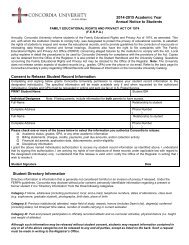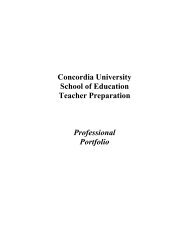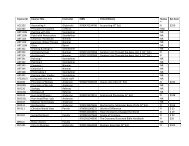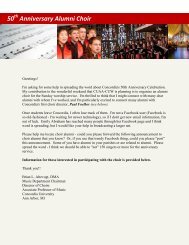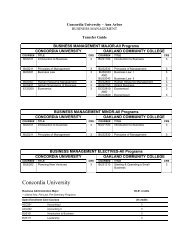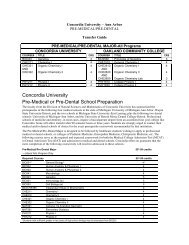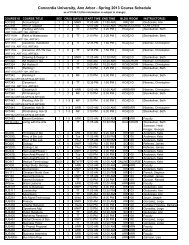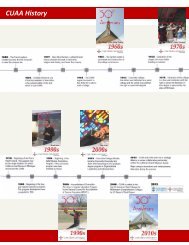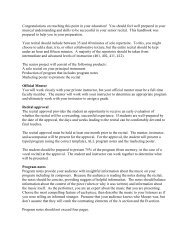2009â2010 Academic Catalog - Concordia University Ann Arbor
2009â2010 Academic Catalog - Concordia University Ann Arbor
2009â2010 Academic Catalog - Concordia University Ann Arbor
Create successful ePaper yourself
Turn your PDF publications into a flip-book with our unique Google optimized e-Paper software.
<strong>Concordia</strong> <strong>University</strong> <strong>Ann</strong> <strong>Arbor</strong> 2009–2010 <strong>Academic</strong> <strong>Catalog</strong><br />
KIN334 Biomechanics credits: 3<br />
Students examine the role of the skeletal, muscular, and nervous systems in human movement. Basic mechanical principles<br />
underlying and effecting efficient human movement are examined.<br />
KIN335 Physiology of Exercise credits: 3<br />
Students investigate the application of physiological principles to the study of human performance related to sports and leisure<br />
activities.<br />
KIN350 Coaching Methods credits: 3<br />
This course presents the theories of coaching and strategies of team sports.<br />
KIN400 Tests & Measurements in Physical Educ credits: 2<br />
The history, theory, and principles of testing in a physical education program are presented. Predictive and inferential aspects of<br />
statistics.<br />
KIN401 Teaching Rhythms & Dance credits: 2<br />
This course focuses on the methods and techniques of instruction in rhythmic and dance activities.<br />
KIN402 Theory & Practice of Individual Sports credits: 2<br />
This course focuses on instructional strategies and techniques. Traditional individual sports and games of American culture will be<br />
taught as will those of other cultures and countries.<br />
KIN405 Theory & Practice of Team Sports/Games credits: 2<br />
This course focuses on instructional strategies and techniques. Traditional games of American culture will be taught, as will the<br />
sports of Native Americans and other cultures and countries.<br />
KIN410 Health Education credits: 3<br />
Major contemporary health issues, methods of instruction, and curriculum design and planning are discussed.<br />
KIN483 Senior Project credits: 2<br />
A culminating experience in which the student uses the skills and knowledge acquired in her or his previous preparation in the<br />
execution of an original (to the student) project dealing with an issue, question or problem of importance in the natural sciences or<br />
mathematics. Results of the project are communicated in an oral public presentation and a written paper. Prerequisites: Senior<br />
standing & instructor's permission & 24 credits completed in Natural Science major.<br />
KIN490 Physical Education Internship credits: 1<br />
Physical education internship. Prerequisite: Instructor's permission<br />
LAN282 Language, Communication & Culture credits: 3<br />
Examines the forms and functions of oral and written communication. Emphasis is placed on the role culture plays in human<br />
communication processes, especially in interpersonal relationships and the mass media.<br />
LAN435 Literature for Young Adults credits: 3<br />
Students receive a general survey of the wide body of literature which is available for use with adolescents, as well as criteria for<br />
evaluation and presentation of a variety of techniques for teaching such literature.<br />
LAN437 Children's Literature credits: 3<br />
Provides a general survey of the wide body of literature that is available to use with children, as well as criteria for evaluation and<br />
presentation of a variety of techniques for teaching such literature.<br />
LAN483 Methods of Language Arts Reflective Assessment/Senior Project credits: 1<br />
Focuses on reflective assessment of content, pedagogy, and materials used to teach language arts at the elementary level, including<br />
student goal setting and curricular differentiation. Senior standing is required. Prerequisites: EDU340 & EDU341 & EDU362 &<br />
admission to School of Education: Elementary & instructor's permission<br />
LAT101 Elementary Latin I credits: 3<br />
This course introduces the rudimentary elements of Latin grammar, syntax, vocabulary, pronunciation, and translation. Students<br />
also receive an introduction into the technical discourse of grammatical analysis. An additional hour of laboratory work is required<br />
weekly.<br />
LAT102 Elementary Latin II credits: 3<br />
Continuation of Elementary Latin I. As with LAT101, an additional hour of laboratory work is required weekly. Prerequisite:<br />
LAT101<br />
MAT090 Pre-College Mathematics credits: 0<br />
Students learn fundamental math concepts involving whole numbers, fractions, decimals, and mixed numbers, and simple<br />
equations. This course is especially designed for students with low basic math skills. No college credit awarded.<br />
MAT101 Beginning Algebra credits: 3<br />
Students learn fundamental concepts involving sets, whole numbers, integers, and rational numbers, linear and quadratic<br />
equations, and use basic algebraic operations to solve problems. Prerequisite: MAT090<br />
Pg. 108 of 118



